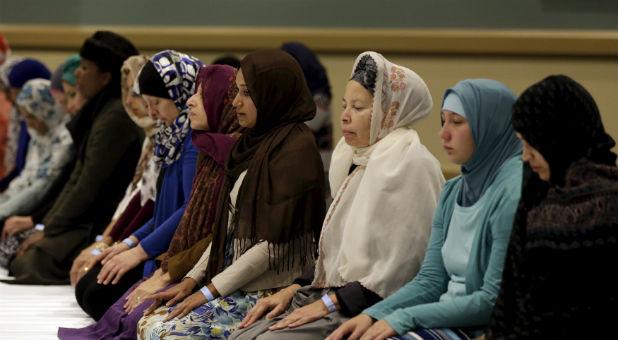Hadith of Um Humayd: A specific context not a general rule
The context of the Hadith narrated by Um Humayd, which is not introduced in the narrations of Ibn Hibban and Ahmad, being the famous narrations, At-Tabarany, Al-Bayhaquy, Ibn Abu Shaybah, Ibn Abu `Asim and others with authentic additions, its context is an argument between the woman and her husband.
The argument was due to Um Humayd’s punctual attendance of congregational prayer in the Prophet’s (peace and blessings be upon him) Mosque.
In these narrations, Um Humayd said, “O Messenger of Allah, we like to pray with you but our husbands prevent us (from doing so).[12]
This context resolves the conflict between the Hadiths narrated on this issue, especially the Hadiths with general rulings banning prevention of women from frequenting the Mosque, and this Hadith.
Here, the Messenger of Allah (peace and blessings be upon him) meant to advise Um Humayd regarding solving her marital disagreement through complying with her husband’s request.
So, he (peace and blessings be upon him) did not mean enacting a general legislation that obliges all Muslim women at all times and places. However, the Messenger’s (peace and blessings be upon him) intention in this case is not explicit; yet, it is the only possible interpretation that works out the conflict between texts, knowing that application of a text is more proper than neglecting it.
Weak hadiths used to deny women access to mosques
There is a number of weak Hadiths that are introduced as corroborating evidence by scholars advocating prevention of women from frequenting the Mosque. Yet, such weak narrations do not constitute a solid proof or countermand the numerous authentic Hadiths supporting the contrary opinion.
An example of these weak narrations is the hadith that the Prophet asked his daughter Fatimah about which is best for a woman. She answered, “That she should see no man and that no man should see her.” So, the Prophet (peace and blessings be upon him) hugged her and said, “(Good) offspring descending from one another.[13]Besides its weak chain of narration (Isnad), the meaning of the Hadith contradicts with dozens of Hadiths referred to above about the female Companions (may Allah be pleased with them).
Rather, it contradicts explicit statements of the Quran, including the verse in which Almighty Allah says,
{Then whoever argues with you about it after [this] knowledge has come to you – say, ‘Come, let us call our sons and your sons, our women and your women, ourselves and yourselves, then supplicate earnestly [together] and invoke the curse of Allah upon the liars [among us].’} (Aal `Imran 3:61)
This verse explicitly involves Fatimah, daughter of the Prophet (peace and blessings be upon him), within the context of Mubahalah. Besides, in Ibn Kathir’s commentary on the verse, he mentioned the story of Najran’s delegation, stating,
“They refused to acknowledge that. Then, when dawn broke, the Prophet (peace and blessings be upon him) after informing them of the news, approached with Al-Hassan and Al-Hussayn wrapped in velvet cloth of his, and Fatimah walking behind him forMula`anah.[14]
There are also other Hadiths that involve Fatimah (may Allah be pleased with her) having normal interactions with men within the confines of the Shariah.
Pages: 1 2 3 4